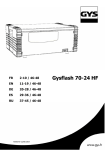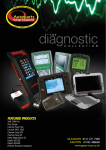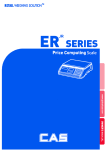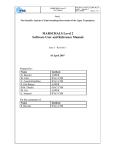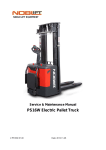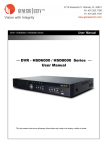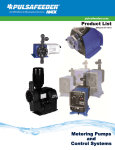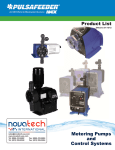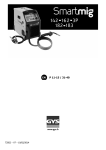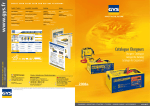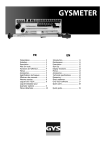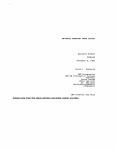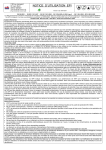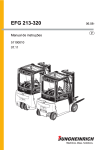Download LANDPORT EUROPE AUTOMOTIVE BATTERIES & ACCESSORIES
Transcript
AUTOMOTIVE BATTERIES & ACCESSORIES LANDPORT EUROPE 2015 2016 TABLE OF CONTENTS LAY-OUT/TERMINAL/HOLD-DOWN BATTERIES Lay-out Compact batteries 4-5 Starter batteries 6-7 Start-stop batteries 8-9 Professional batteries 10 - 11 Classic batteries 12 - 13 Marine batteries 14 - 15 Semi-traction batteries 16 - 17 Deep Cycle batteries 18 - 19 Gel batteries 20 - 21 0 1 2 3 4 19 Terminal ACCESSORIES 3 Chargers & Boosters 22 - 27 Accessories 28 - 33 Tools 34 - 35 Technical information 36 - 43 Disclaimer and terms & conditions 44 - 45 1 3/8” 3 (FRONT) 21 (SIDE) Ф 20 [0.787] M8 [0.315] 7 [0.276] 2 (TOP) DUAL B T11 Hold-down B1 B3 B4 B9 Article Number Voltage (V) Capacity (Ah/20hr) Length (mm) Width (mm) Height (mm) Total Height (mm) CCA (EN) Layout Terminal Holddown COMP 1 12 44 211 175 175 175 360 0 1 B3 COMP 2 12 60 242 175 175 175 540 0 1 B3 COMP 3 12 74 278 175 175 175 680 0 1 B3 COMP 5 12 100 353 175 175 175 850 0 1 B3 COMP 140 12 140 513 189 195 223 760 3 1 - COMP 180 12 180 513 223 195 223 1000 3 1 - COMP 230 12 230 513 274 216 242 1150 3 1 - COMPACT BATTERIES Compact Car Compact Truck LANDPORT EUROPE FOR BATTERY APPLICATION LIST, PLEASE VISIT WWW.LANDPORTBV.COM OR WWW.ACCUVIKS.BE 5 Article Number Voltage (V) Capacity (Ah/20hr) Length (mm) Width (mm) Height (mm) Total Height (mm) CCA (EN) Layout Terminal Holddown LMFV 53226 12 32 178 128 227 227 240 0 1 B1 LMFV 53520 12 35 187 127 200 220 240 0 3 - LMFV 53522 12 35 187 127 200 220 240 1 3 - LMFV 53587 12 35 187 127 200 220 300 0 3 B1 LMFV 53890 12 38 243 127 180 199 240 1 1 - LMFV 54059 12 40 175 175 190 190 300 0 1 B3 LMFV 54459L 12 44 207 175 175 175 360 0 1 B3/B4 LMFV 54464 12 44 210 175 190 190 360 1 1 B3/B4 LMFV 54519 12 45 242 175 175 175 360 0 1 B3/B4 LMFV 54523 12 45 236 127 200 220 300 0 1 - LMFV 54524 12 45 236 127 200 220 300 1 1 - LMFV 54551 12 45 236 127 200 220 300 1 3 - LMFV 54577 12 45 220 135 204 225 300 0 1 B1 LMFV 54579 12 45 220 135 204 225 300 1 1 B1 LMFV 54584 12 45 234 127 200 220 300 0 3 - LMFV 55041 12 50 200 170 200 220 360 0 1 - LMFV 55042 12 50 200 170 200 220 360 1 1 - LMFV 55067 12 50 207 175 190 190 420 0 1 B3/B4 LMFV 55559 12 55 242 175 190 190 420 0 1 B3/B4 LMFV 55559L 12 55 242 175 175 175 420 0 1 B3/B4 LMFV 55565L 12 55 242 175 175 175 420 1 1 B3/B4 STARTER BATTERIES Calcium Start 30% EXTRA CCA! LMFV 56010 12 55 238 180 182 182 460 1 21 - LMFV 56062 12 60 230 171 200 220 390 0 1 B1 LMFV 56063 12 60 230 171 200 220 390 1 1 B1 LMFV 56068 12 60 230 171 200 220 390 0 1 - LMFV 56069 12 60 230 171 200 220 390 1 1 - LMFV 56077 12 60 242 175 175 175 600 0 1 B3/B4 LMFV 56219 12 62 242 175 190 190 480 0 1 B3/B4 LMFV 56221 12 62 242 175 190 190 480 1 1 B3/B4 LMFV 56420 12 64 278 175 175 175 640 0 1 B3/B4 LMFV 57010 12 65 268 180 182 182 510 1 21 - LMFV 57024 12 70 266 174 200 225 540 1 1 B1 LMFV 57029 12 70 266 174 200 225 540 0 1 B1 LMFV 57219L 12 72 275 175 175 175 680 1 1 B3/B4 LMFV 57412 12 74 278 175 190 190 680 0 1 B3/B4 LMFV 57412L 12 74 278 175 175 175 680 0 1 B3/B4 LMFV 58035 12 80 310 175 190 190 720 0 1 B3/B4 LMFV 58211 12 82 310 175 175 175 720 0 1 B3/B4 LMFV 58213 12 82 315 175 175 175 720 1 1 B3/B4 LMFV 58515 12 85 353 175 175 175 760 0 1 B3/B4 LMFV 58821 12 88 350 175 190 190 640 1 1 B3/B4 LMFV 58827 12 88 353 175 190 190 640 0 1 B3/B4 LMFV 60032 12 100 302 172 200 219 680 0 1 B1 LMFV 60033 12 100 302 172 200 219 680 1 1 B1 LMFV 60038 12 100 353 175 190 190 850 0 1 B3/B4 LMFV 60800 12 102 327 170 206 228 750 19 1 - LMFV 61042 12 110 393 175 190 190 950 0 1 B3 ULTRA 1 12 45 207 175 175 175 440 0 1 B3/B4 ULTRA 2 12 60 242 175 175 175 600 0 1 B3/B4 ULTRA 3 12 74 276 175 175 175 760 0 1 B3/B4 ULTRA 5 12 92 353 175 190 190 860 0 1 B3/B4 Ultra Start LANDPORT EUROPE 7 Article Number START-STOP BATTERIES 2X CYCLE LIFE Voltage (V) Capacity (Ah/20hr) Length (mm) Width (mm) Height (mm) Total Height (mm) CCA (EN) Layout Terminal Holddown Enhanced Flooded Battery (EFB) 3X CYCLE LIFE EFB 560500056 12 60 242 174 190 190 560 0 1 B3 EFB 565500065 12 65 277 174 175 175 650 0 1 B3 EFB 570500065 12 70 277 174 190 190 650 0 1 B3 EFB 580500073 12 80 315 174 190 190 730 0 1 B3 EFB 610500095 12 110 398 174 190 190 950 0 1 B3 60 241 175 190 190 680 0 1 B3 Absorbent Glass Mat (AGM) AGM 560901068 12 9 AGM 570901076 12 70 278 175 190 190 760 0 1 B3 AGM 580901080 12 80 314 175 190 190 800 0 1 B3 AGM 595901085 12 95 353 175 190 190 850 0 1 B3 Start-Stop EFB NEW! • • Suitable for modern, environmentally friendly vehicles with a more simple start-stop function. Two times longer cycle life and more resistant to deep discharging than conventional starter battery. Start-Stop AGM • • LANDPORT EUROPE Suitable for modern, environmentally friendly vehicles with an advanced start-stop function with various onboard energy consumers. Three times longer cycle life and more resistant to deep discharging than conventional starter battery. FOR BATTERY APPLICATION LIST, PLEASE VISIT WWW.LANDPORTBV.COM OR WWW.ACCUVIKS.BE Article Number Voltage (V) Capacity (Ah/20hr) Length (mm) Width (mm) Height (mm) Total Height (mm) CCA (EN) Layout Terminal Holddown ACLPV HD60013N 12 100 286 260 226 226 640 2 1 - ACLPV HD60026N 12 100 413 175 210 223 600 0 1 - ACLPV HD60035N 12 100 413 172 210 233 600 1 1 - ACLPV HD60527N 12 105 345 175 210 230 680 1 1 - ACLPV HD60528N 12 105 345 175 210 230 680 0 1 - ACLPV HD60530N 12 105 345 175 210 230 680 0 1 B1 ACLPV HD62034N 12 120 513 189 200 220 680 3 1 - ACLPV HD62512N 12 125 345 175 285 285 720 0 1 - ACLPV HD62514N 12 125 345 175 285 285 720 1 1 - ACLPV HD63527N 12 135 360 253 212 232 760 0 1 - ACLPV HD64020N 12 140 513 189 200 220 760 3 1 - ACLPV HD64317N 12 143 513 223 203 223 900 3 1 - ACLPV HD66514N 12 165 513 223 203 223 900 3 1 - ACLPV HD68034N 12 180 513 223 203 223 1000 3 1 - ACLPV HD70027N 12 200 518 276 222 242 1050 3 1 - ACLPV HD73011N 12 230 518 276 222 242 1150 3 1 - ACLPV SHD62034N 12 120 513 189 195 223 680 3 1 - ACLPV SHD63013N 12 130 514 218 186 206 680 3 1 - ACLPV SHD63539N 12 135 514 175 210 210 1000 3 1 B3 ACLPV SHD63547N 12 135 514 175 210 210 1000 4 1 B3 ACLPV SHD64020N 12 140 513 189 195 223 760 3 1 - ACLPV SHD68034N 12 180 513 223 195 223 1000 3 1 - ACLPV SHD68089N 12 180 514 218 190 210 1000 3 1 B3 ACLPV SHD73011N 12 230 518 274 216 242 1150 3 1 - PROFESSIONAL BATTERIES Heavy Duty (HD) GLASS FIBER SEPARATORS FLAT LID LANDPORT EUROPE Super Heavy Duty (SHD) Super Heavy Duty PRO (SHD PRO) LMFV 64020SMF 12 140 513 189 200 220 760 3 1 - LMFV 68034SMF 12 180 513 223 203 223 1000 3 1 - LMFV 73011SMF 12 230 518 276 222 242 1150 3 1 - FOR BATTERY APPLICATION LIST, PLEASE VISIT WWW.LANDPORTBV.COM OR WWW.ACCUVIKS.BE 11 Article Number CLASSIC BATTERIES Voltage (V) Capacity (Ah/20hr) Length (mm) Width (mm) Height (mm) Total Height (mm) CCA (EN) Layout Terminal Holddown ACLPV 06612N 6 66 164 174 164 180 360 2 1 B4 ACLPV 08215N 6 82 215 168 177 177 360 2 1 B9 ACLPV 08411N 6 84 228 171 186 206 390 2 1 - ACLPV 11213N 6 112 490 110 220 220 500 0 1 - ACLPV 11215N 6 112 228 171 186 206 540 2 1 - ACLPV 14023N 6 140 257 171 216 235 720 2 1 B1 ACLPV 16022N 6 160 302 170 220 220 760 2 1 - ACLPV 22013 6 220 403 175 216 235 1000 2 1+1 B1 Classic 6V 13 Classic 12V LANDPORT EUROPE ACLPV 55716N 12 57 242 175 155 175 420 0 1 B1 ACLPV 55717N 12 57 242 175 155 175 420 1 1 B1 ACLPV 57016N 12 70 490 108 195 229 450 1 1 - FOR BATTERY APPLICATION LIST, PLEASE VISIT WWW.LANDPORTBV.COM OR WWW.ACCUVIKS.BE Article Number MARINE BATTERIES Capacity (Ah/20hr) Length (mm) Width (mm) Height (mm) Total Height (mm) CCA (EN) Layout Terminal Holddown LMFM 62034 12 120 503 182 193 215 680 3 1 - LMFM 64020 12 140 503 182 193 215 760 3 1 - LMFM 66514 12 165 503 216 193 214 900 3 1 - LMFM 68034 12 180 503 216 193 214 1000 3 1 - Start & Light Cyclic FLAT LID MAINTENANCE FREE LANDPORT EUROPE Voltage (V) 15 LMFM 70027 12 200 503 264 517 239 1050 3 1 - LMFM 72511 12 225 503 264 517 239 1150 3 1 - FOR BATTERY APPLICATION LIST, PLEASE VISIT WWW.LANDPORTBV.COM OR WWW.ACCUVIKS.BE Article Number Voltage (V) Capacity (Ah/20hr) Capacity (Ah/5hr) Length (mm) Width (mm) Height (mm) Total Height (mm) CCA (EN) Layout Terminal Holddown STV 95406N 12 50 40 210 175 190 190 - 0 1 B3 STV 95551N 12 70 55 260 175 203 223 - 0 1 - STV 96051N 12 130 105 513 189 193 223 - 3 1 B1 STV 96351N 12 180 135 513 223 193 223 - 3 1 - STV 96801N 12 230 180 518 273 217 242 - 3 1 - SEMI-TRACTION BATTERIES Wet Charged Wet Charged Traction DC TR190 12 200 - 513 223 193 223 1000 3 1 - DC TR220 12 220 - 518 273 217 242 1050 3 1 - Sealed Maintenance Free (SMF) AGM LANDPORT EUROPE STV 95502SMF 12 60 50 242 175 190 190 - 0 1 B3 STV 95602SMF 12 75 60 278 175 190 190 - 0 1 B3 STV 95752SMF 12 90 75 353 175 190 190 - 0 1 B3 STV 95804SMF 12 105 85 345 175 230 230 - 0 1 - STV 96002SMF 12 125 100 345 175 285 285 - 0 1 - STV 24DC 12 80 - 257 172 200 220 680 1 Dual B1 STV 27DC 12 90 - 302 172 200 220 700 1 Dual B1 STV 31DC 12 102 - 330 172 218 242 750 1 Dual - AGM ST50 12 60 52 242 175 190 190 460 0 1 B3 AGM ST60 12 70 60 278 175 190 190 600 0 1 B3 AGM ST80 12 80 80 353 175 190 190 720 0 1 B3 AGM ST105 12 95 80 345 175 210 230 800 0 1 B3 AGM ST130 12 140 115 513 189 203 223 950 3 1 - AGM ST180 12 170 135 513 223 203 223 1050 3 1 - AGM ST200 12 185 155 518 274 222 242 1200 3 1 - AGM ST220 12 220 185 518 274 222 242 1400 3 1 - AGM FOR BATTERY APPLICATION LIST, PLEASE VISIT WWW.LANDPORTBV.COM OR WWW.ACCUVIKS.BE 17 Article Number Voltage (V) Capacity (Ah/20hr) Capacity (Ah/5hr) Length (mm) Width (mm) Height (mm) Total Height (mm) Layout Terminal Holddown DC US2200 6 232 181 260 181 286 286 2 Dual - DC US 145 6 251 213 260 181 302 302 2 Dual - DC US 305 6 310 261 302 181 371 371 2 Dual - DC L16 6 385 297 302 181 425 425 2 Dual - DC GF6210 6 213 185 260 180 254 274 2 Dual - DC DTA6245 6 245 221 243 188 275 275 2 T11 - 8 170 138 260 181 286 286 1 1 - DC 27 TM 12 105 89 320 165 203 233 1 Dual - DC US 12V xC2 12 155 122 333 179 289 289 1 1 - TB 6PZS 195 6 250 195 245 190 285 285 2 1 - TB 4PZS 110 12 158 117 345 170 285 285 0 1 - DEEP CYCLE BATTERIES Deep Cycle 6V Deep Cycle 6V AGM Deep Cycle 8V DC US 8VGC Deep Cycle 12V Tubular Plates LANDPORT EUROPE FOR BATTERY APPLICATION LIST, PLEASE VISIT WWW.LANDPORTBV.COM OR WWW.ACCUVIKS.BE 19 Article Number Voltage (V) Capacity (Ah/20hr) Length (mm) Width (mm) Height (mm) Total Height (mm) Layout Terminal Holddown 6 180 244 190 275 275 2 1 - GB 016 12 16 181 76 167 167 0 B - GB 019 12 19 185 80 170 170 0 B - GB 025 12 24 176 167 126 126 0 B - GB 030 12 30 197 132 180 180 1 B - GB 040 12 40 210 175 175 175 0 1 B4 GB 060 12 60 278 175 190 190 0 1 B3 GB 080 12 80 353 175 190 190 0 1 B3 GB 085 12 85 330 171 236 236 1 1 - GB 110 12 115 286 269 230 230 2 1 - GB 120 12 120 513 189 223 223 3 1 - GB 120S 12 125 345 175 290 290 0 1 - GB 140 12 140 513 223 223 223 3 1 - GB 210 12 210 518 276 242 242 3 1 - GEL BATTERIES Gel 6V GB 180/6 Gel 12V LANDPORT EUROPE FOR BATTERY APPLICATION LIST, PLEASE VISIT WWW.LANDPORTBV.COM OR WWW.ACCUVIKS.BE 21 Article Number Description Volt Amp PC SPI2 Landport Charger/Maintainer Automatic charger for lead-acid batteries up to 25 Ah 3x faster: multi-stage charging for added precision, safety and battery life. Powered by Shumacher 6/12 V 2,0 A PC SPI3 Landport Charger/Maintainer Automatic charger for lead-acid and LITHIUM LIFEPO4 batteries up to 50 Ah 3x faster: multi-stage charging for added precision, safety and battery life. Powered by Schumacher 12 V 3,0 A PC4L 3600 4 Load Charge Box 3.6 Covers most types of batteries from 1,2 Ah to 50 Ah. The modus is easily changed with the MODE-key which emphasizes how uncomplicated it is and offers a simple flexibility. 12 V 0,8/3,6 A CHARGERS & BOOSTERS 23 LANDPORT EUROPE PC4L 7000 4 Load Charge Box 7.0 Particularly suitable for home-mobiles, buses, agricultural machinery and boots with capacities from 12V: 14 Ah to 130 Ah and 24V: 14 Ah to 60 Ah. 12/24 V 7,0/3,5 A PG GYSTECH 3800 Powerful, compact and light Automatic charger for all types from 1,2 Ah to 60 Ah 12 V 0,8/3,8 A PG GYSTECH 7000 Competitive, space saving and light Automatic charger for all types from 12V: 14 Ah to 130 Ah and 24V: 14 Ah to 60 Ah 12/24 V 7,0/3,5 A PG GYSFLASH 4A Powerful, compact, light and water proof. Automatic charger for all types from 1,2 to 70 Ah 12 V 0,8/4A Article Number Description Volt Amp PG GYSFLASH 7A Powerful, compact, light and water proof (IP 65) Automatic charger for all types from 1,2 Ah to 130 Ah 12 V 0,8/7 A 6/12 V 3/7 A 6/12/24 V 3/7 A PG BATIUM 7-12 PG BATIUM 7-24 PG BATIUM 15-12 PG BATIUM 15-24 GYS Charger Batium serie guarantees maximum effectiveness and security. Automatic charger for all types from 15 Ah to 130 Ah GYS Charger Batium serie guarantees maximum effectiveness and security. Automatic charger for all types from 35 Ah to 225 Ah 6/12 V 7/10/15 A 6/12/24 V 7/10/15 A Article Number Description Volt Amp PG GYSPACK AUTO GYS 12V portable booster pack Ideal for car emergency boost. 12 V 1250 A PG GYSPACK PRO GYS 12V portable booster pack Instantaneously starts cars, camper vans and vans. Also 12V DC power supply including LED light. 12 V 1750 A PG GYSPACK TRUCK GYS 12/24V portable boost pack Instantaneously starts cars, camper vans, vans and trucks. Also 12V DC power supply including LED light. 12/24 V 3200 A 1600 A GYS 12/24V high performance booster Delivers exceptional power on 12V or 24V to start a wide range of vehicles including trucks and buses. 12/24 V PG GYSPACK OBD GYS Memory Saver Saves the internal memory of your car when it is necessary to disconnect the battery. Compact, protable and easy to use. 12 V PM MDX-325P Midtronics Battery Tester 100-900 CCA (EN) (integrated printer) 12 V PM MDX-335P Midtronics Battery Tester 100-900 CCA (EN) (integrated printer) 12 V PM MDX-645 Midtronics Battery Tester 100-1200 CCA (EN) 6/12 V PM MDX-645P Midtronics Battery Tester 100-1200 CCA (EN) (integrated printer) 6/12 V 24 PG BATIUM 25-24 GYS Charger Automatic charger for all types from 35 Ah to 350 Ah. Also suitable for Deep Cycle batteries from 35 to 180 Ah 6/12/24 V 7/15/25 A STARTPACK PRO 12.24 (on request) LBC 500 serie (on request) ProMax 200 serie (on request) TBC 600 serie (on request) 25 Xenteq Chargers LBC 500 serie Chargers available from 12V 10A to 24V 5A Xenteq Chargers ProMax 200 serie Chargers available from 12V 15-100A and 24V 10-70A Xenteq Chargers TBC 600 serie Cahrgers available form 12V 15-50A and 24V 10-40A (on request) 6200 A 3100 A Article Number Description POWERSLAVE Electron 950 Volts Amps CCA Electonically protected Cables Clamps Weight H*L*W Spikes filter Charger MEMO Output Generator test 12 Volts 950 A 420 A / -18oC Full 35mm2/1m70 740 A 15 kg 350*330*130 900 V 2,5 A Full automatic inside Yes 13,5 V POWERSLAVE Electron 1100S 26 Volts Amps CCA Electonically protected Cables Clamps Weight H*L*W Spikes filter Charger MEMO Output Generator test 12 Volts 1100 A 520 A / -18oC Full 35mm2/1m70 740 A 17 kg 350*330*130 900 V 2,5 A Full automatic inside Yes 13,5 V POWERSLAVE Electron V1200ES Volts Amps CCA Electonically protected Cables Clamps Weight H*L*W Spikes filter Charger MEMO Output Generator test 12 Volts 1200 A 520 A / -18oC Full 35mm2/1m70 750 A 17 kg 350*330*130 900 V 2,5 A Full automatic inside Yes 13,5 V POWERSLAVE Powerpack T1250 Volts Amps CCA Electonically protected Peak amps Cables Clamps Weight H*L*W Spikes filter Charger MEMO Output Generator test Trolley 12 Volts 1250 A by 7 Volts 715 A / 7 Volts -18oC Full Short circuit test 4200 A/0,5 volts 50mm2/1m70 Hi flex 1000 A 23,9 kg 270*310*190 900 V 2,5 A 2,5 Ka 12 V/2 A full automatic inside Yes 13,5 V Option Article Number Description POWERSLAVE Powerpack V1200 Volts Amps CCA Electonically protected Peak amps Cables Clamps Weight H*L*W Spikes filter Charger MEMO Output Generator test Trolley 12 & 24 Volts 1100/950 A by 7 & 14 Volts 2 x 420 A / 7 volts -18oC Full Short circuit test 3600 A/0,5 volts 50mm2/1m70 Hi flex 750 A 25 kg 210*330*210 900 V 2,5 A 2,5Ka 2 x 12 V / 2A Full automatic inside 13,5 V & 27 V Option POWERSLAVE Powerpack V1500 Volts Amps CCA Electonically protected Peak amps Cables Clamps Weight H*L*W Spikes filter Charger MEMO Output Generator test 12 & 24 Volts 1250/1500 A by 7 & 14 Volts 2 x 520 A / 7 volts -18oC Full Short circuit test 4800 A/0,5 volts 50mm2/1m70 Hi flex 1000 A 32 kg (320+550)*400*260 900 V 2,5 A 2,5Ka 2 x 12 V / 2A Full automatic inside 13,5 V & 27 V POWERSLAVE Powerpack V1900 Volts Amps CCA Electonically protected Peak amps Cables Clamps Weight H*L*W Spikes filter Charger MEMO Output Generator test Wheels 12 & 24 Volts 1500/1900 A 2 x 815 A / 7 volts -18oC Full Short circuit test 8400 A/0,5 volts 50mm2/2m50 Hi flex 1000 A 56 kg (630+320)*450*380 900 V 2,5 A 2,5Ka 2 x 12 V / 7A Full automatic inside 13,5 V & 27 V Airwheels + brake wheel 27 Article Number Description BALV POOLPOS Clamp for standard battery terminal (+) BALV POOLNEG Clamp for standard battery terminal (-) BALV TPOS Clamp for standard battery terminal (+) BALV TNEG Clamp for standard battery terminal (-) BALV JAPPOS Clamp for Japanese battery terminal (+) BALV JAPNEG Clamp for Japanese battery terminal (-) ACCESSORIES 29 LANDPORT EUROPE BALV FORDPOS Ford adaptor clamp (+) BALV FORDNEG Ford adaptor clamp (-) BALV MANPOS Heavy Duty clamp for stand terminal (+) BALV MANNEG Heavy Duty clamp for stand terminal (-) BALV USA USA adaptor clamp (set) BALV QUICK SET Terminal connector Quick set Article Number BALV 100003 Description Description Volt Watt LAMP 2200111 LAMP 2200120 LAMP 2200121 BA 9 S BA 9 S BA 9 S 6 V 6 V 12 V 5 4 4 LAMP 2200302 LAMP 2200304 LAMP 2200305 LAMP 2200306 LAMP 2200381 B 15 S B 15 S B 15 S B 15 S B 15 S 6 V 12 V 6 V 12 V 12 V 5 5 10 10 21 LAMP 2200401 LAMP 2200410 P 26 S P 26 S 6 V 12 V 15 15 LAMP 2200501 P 45 T 12 V 45/40 Terminal Japanse-standard adaptor set (3>1) BALV M6-STANDARD M6-standard adaptor set for M6 insert BALV M8-STANDARD M8-standard adaptor set for M8 insert BALV 100002 Art. No. Butterfly nut M8 30 31 BALV 100005 BALV GEFO Ventilation plugs and tube Acid gravity tester LAMP 2200518 LAMP 2200520 LAMP 2200521 LAMP 2200523 LAMP 2200528 LAMP 2200529 BA 20 D BA 20 D BA 20 D BA 20 D BA 20 D BA 20 D 6 V 6 V 6 V 12 V 12 V 12 V 15/15 25/25 35/35 35/35 45/40 25/25 LAMP 2201607 H7 PX 26 D 12 V 55 LAMP 2201610 H1 PX 43 T 12 V 35/35 Sulphuric Acid 37% 1 ltr BALV 100001 Sulphuric Acid 37% 5 ltr (on request) BALV WATER5 Deminaralised water 5 ltr Art. No. Description Volt Watt LAMP 2201655 H1 P 14,5 S 12 V 55 LAMP 2201658 PK 22 SH 3 12 V 60/55 LAMP 2201661 LAMP 2201671 LAMP 2251661 LAMP 2261661 H4 P 43 T H4 P 43 T H4 P 43 T +30% H4 P 43 T Xenon 12 V 12 V 12 V 12 V 60/55 100/80 60/55 60/55 LAMP 2201666 H4 P 45 T 12 V 60/55 32 33 LAMP 2201732 W 2,1 x 9,5 D 12 V 5 LAMP 2203380 LAMP 2203381 BAY 15 D BAY 15 D 6 V 12 V 21/5 21/5 LAMP 2251607 H7 PX 26 D +50% Xenon 12 V 55 Art. No. TOOLS Description GERE 1044 38 Piece socket set 1/4 GERE 1049 45 Piece socket set 1/4 + 3/8 GERE 1047 60 Piece socket set 3/8 35 GERE 1048 LANDPORT EUROPE 93 Piece socket set 1/4 + 1/2 ASSEMBLY, MAINTENANCE AND TESTING DYNAC BATTERIES: Technical information Important - caution The oxyhydrogen gas contained in the battery is highly explosive. Always make sure that the charger is switched off before connecting or disconnecting the battery: one tiny spark is enough to cause an explosion that could permanently damage the face and eyes. In the event of an accident, in which acid splashes into the eyes or onto bare skin, rinse immediately using plenty of water. If acid splashes into the eyes – contact your doctor. Assembly in the car Cars with alternators have the negative connected to the earth. This may vary with older models (see the car manual for assembly). Clean the terminal posts and base plate with warm water. Always assemble the conductor cable first, and the earth wires later. This will prevent short-circuiting caused by the use of tools (which may cause slight damage). Only use good quality tools. After assembly, grease the cable clamps and terminal posts with clean, petroleum jelly or approved grease. The battery should be screwed down well, but should not be overly tightened. NB! When changing the battery or carrying out repairs which require the battery to be disconnected from the car, we instruct you to provide an alternative power supply for the car, e.g. by using an “external” battery. If you do not do this the electronics in the car may be destroyed in the worst case. Maintanance A battery is a vital element of the electrical system. Normally, the system itself will keep the battery charged. In the case of continual short journeys and heavy power usage additional charging may be required, particularly during the coldweather season. Top up with distilled or chemically purified water only. Never use acid or special additives. If a relatively new battery needs to be topped up regularly this may indicate that the battery is overloaded. In such cases the electrical installation should be inspected and the defect repaired. Avoid chemical or other types of products that promise “miraculous” changes to old or worn batteries. Testing If there is any doubt that the battery is no longer working satisfactorily it should be tested. The most simple and best means of testing a battery and its state-of-charge is to use a hydrometer. The measurement of the specific gravity in each cell will determine how the battery should be treated further. If the battery is discharged, it will need to be recharged before proceeding with the following check (see the battery test table). If a relatively new battery is discharged and the user has left on the lights, radio, etc., it will need to be recharged. If the car has not been driven sufficiently during the wintertime and there has been substantial power usage, the battery will need to be recharged. This assumes that the regulator/dynamo is functioning satisfactorily. In the case of continually low specific gravity, the most probable cause is discharge. If, on the other hand, no reasonable explanation can be found as to why the battery is discharged, the cause should be sought outside the battery. In such cases, both the starter motor and the dynamo should be checked. Many motorists are under the impression that the dynamo charges sufficiently and only the built-in indicator is not lit up. This is no absolute guarantee for sufficient charging current, as that the indicator light can go out at 1-2 Amps, without this being sufficient enough to charge the battery. The charging current should therefore be checked regularly. Measured across the terminal posts, the charging voltage of the vehicle should read 14.2 – 14.4 volts for temperatures above 25°C and for high engine turnover (approximately 2000 revs). LANDPORT EUROPE NB! If the reading is lower this means that the battery does not charge fully while driving and will need to be charged by an external battery, which will often depend on the amount of charging voltage for the required level. 37 Be aware that for normal driving it will take approximately 20 minutes for the power that will be used for a good cold start to be replaced (recharged). It is a fact that most of the damage to batteries is caused by a lack of charging. For this reason, all those who are involved with batteries should be aware of the importance of correct charging. The effect of the cold Most people have experienced on at least one occasion that the capacity of a battery is reduced in cold weather. The effect of the cold on the starting capacity is indicated in the table below: We therefore instruct you to use the following method when activating: 1. Top up the thinned sulphuric acid (specific gravity of 1.28 at 20°C) for all cells until 5mm above the separator, or until the indicated level. 2. Allow the battery to stand for 30 minutes, depending on the temperature. 3. If possible charge the battery again. This will confirm that the battery is in good working order if, after a brief period, there is a continual emission of gases in the collective cells. If the battery is assembled using the incorrect polarity in an installation that uses an alternator, this will cause substantial damage. A fully charged battery that is loaded at: +25ºC gives 0ºC gives -18ºC gives 100% capacity 65% capacity 40% capacity NB! Always check that the voltage and polarity is correct before using the battery. SPECIFIC GRAVITY AND CHARGING Temperature increase: At –18ºC the starting capacity is therefore reduced by 60%. The reason for this is that the resistance in the battery rises, and that the chemical process goes more slowly. At the same time, the reduced effectiveness of the battery places higher demands on starting the motor during the winter as motor oil becomes more viscous during low temperatures. When we know that at –18°C a battery only operates at 40% of the starting capacity, it is easy to understand why starting problems arise during even lower temperatures. It is therefore important to keep the battery fully charged. The freezing point of electrolytes for the following range of concentrations is: The freezing point of electrolytes for the following range of concentrations is: 38 1.100 1.150 1.200 1.250 1.280 freezes freezes freezes freezes freezes at at at at at -7ºC -15ºC -26ºC -52ºC -68ºC Self-discharge When a battery is unused during long-term parking or storage, minor discharge will take place. The amount of selfdischarge varies with the temperature and the age of the battery. Self-discharge decreases by 50% for every 10°C reduction in temperature. That is to say that a battery that can be stored for 4 months at +20°C can be stored at 0°C for approximately 9 months at the same rate of energy loss. Apart from self-discharge there are often a number of circumstances that continually deplete the battery of power. Activating dry-charged batteries The plates in a dry-charged battery are specially treated to give them a longer service life. Before the battery can be used, it is filled with acid before being left for 30 minutes. For topping up with acid the temperature of the acid and the battery should be +20°C. As a rule, is it not necessary to charge a dry-charged battery before use, although it can be advantageous to take the time to do so. If activation takes place at a temperature lower than +15°C or if the battery needs to be stored for more than 12 hours after being topped up with acid, the battery should be charged for two hours up to 1/10 of its capacity (until there is a continual emission of gasses in the collective cells). • Dry-charged batteries can be stored in dry air with a constant temperature, preferably no longer than two years. • During production as well as transport, the battery should not be accessible for damp. • When topping up with acid, the acid and battery should be at least +15°C , preferably approximately +20°C. 2ºC 5ºC 10ºC 15ºC Battery is perfect Battery is slightly drained Battery is drained Battery is heavily drained The greater the increase in temperature, the more important it is that the battery is recharged as quickly as possible. A long journey with the car in which the battery is fitted will give a good charge if the load charge is 14.2 volts at +25°C. In the winter, an additional 0.3 volts is required for every 10 degrees reduction in temperature, or in other words: at –10°C the load charge should be 15.15 volts. This means that cars that are only used for short journeys or in traffic and have no motor heating or repeated cold starts require external chargers in very cold periods. Raising the specific gravity of a dry-charged battery that has “become slightly drained” during storage will require 2 to 3 times more charging time than a normally charged battery with the same specific gravity. The battery is fully charged when the specific gravity is 1.28. Measurement The most simple manner of measuring the specific gravity is to use a hydrometer. When using a hydrometer, sufficient electrolytes must be sucked into the syringe, so that the float floats freely. The specific gravity can then easily be read from the scale on the float. In order to record a correct acid measurement the electrolytes should be mixed well. After topping up with distilled or chemically purified water, the water should first be given the opportunity to mix with the rest of the electrolyte mixture before measurement takes place. Avoid spilling any acid. Acid is highly corrosive and acid splashed in the eyes or on bare skin is harmful. Acid can destroy clothing, wood, metal and varnish. The table below shows the corresponding ratios between acid and the state-of-charge of the battery in percentages. The specific gravity of elektrolytes: Battery state-of-charge +25ºC: Battery state-of-charge -18ºC: 1.280 100%100% 1.240 75%50% 1.200 50% Weak 1.160 25%- 1.1200%- 39 Temperature correction The float scale on the hydrometer is normally based on a temperature (acid) of +25°C. For higher or lower temperatures the result read should be corrected as the specific gravity varies with temperature. It is extremely important to pay attention to this during the wintertime. For every 10°C below +25°C 0.007 is subtracted from the scale and for every 10°C above +25°C 0.007 is added. The table below shows: 1. The acid temperature, 2. The measured specific gravity, 3. The corrected specific gravity. The table shows that the gravity of electrolytes measured at 1.240 for an acid temperature of –18°C is actually 1.208. This means that the battery has a state-of-charge of 50% instead of 75% that was shown by the initial measurement. Maintenance-free batteries cannot be measured using these methods as they have no removable caps. The following method is used for these batteries: The Open Circuit Voltage of the battery is used to find the average specific gravity. The Open Circuit Voltage is measured with a digital voltmeter after the battery has been disconnected (i.e. with no recharging or discharging) for a minimum period of 6 – 8 hours. Open Circuit Voltage (at +25°C) = (specific gravity + 0.84) x the number of cells Specific gravity (at +25°C) = (Open Circuit Voltage: number of cells) – 0.84 Example: Measured voltage = 12.65 volts, number of cells is 6, average specific gravity: (12.65 : 6) – 0.84 = 1.27 g/cm3. 40 1. Acid temperature: 2. Measured specific gravity g/cm3: 3. Corrected specific gravity g/cm3: ºC -30ºC -20ºC -10ºC 0ºC 10ºC 15ºC 20ºC 25ºC 30ºC 35ºC ABC 1,28 1,24 1,20 - - - - - - - - - - - - - - - - - - - - - - - - - - - ABC 1,2411,2011,161 1,2481,2081,168 1,2551,2151,175 1,2621,2221,182 1,2701,2301,190 1,2731,2331,190 1,2761,2361,196 1,2801,2401,200 1,2841,2441,204 1,2871,2471,207 battery that has been primarily manufactured for starting purposes. These type of batteries are often referred to as deep cycle batteries and are used for leisure purposes in caravans, boats, campers and as starter batteries in boats. Leisure batteries are also recommended for use with solar panels. Heavy Duty The special strengthening in the plate groups provides extremely good additional resistance to damage to the battery that may result from extreme vibration. HD batteries are a range of batteries that are especially suited for use where repeated and heavy-duty battery discharge is experienced. Examples are buses, trucks, delivery vans used for short distances and various types of marine vessels. For the latter of these examples, batteries are rarely or never used for starting motors in extremely low temperatures. Separators with fibreglass fill are used in Heavy Duty batteries. Recombination batteries Just as for ordinary batteries, various structures and other methods of use are possible here. Batteries for stationary, starting and continual use have practically all the normal features but do not use water on the negative plate, in other words: the gas is recycled. The gas emission is transformed into water, which is where the name “recombination” originates from. During use, additional pressure is released via a valve, resulting in the name “valve-regulated”. Both names refer to the same process. NB! Recombination batteries should not be opened. Advantages • No topping up with water. • Completely leakage free. Disadvantages • Increased risk of dehydration during overloading/high temperatures; not possible to top up water. • State-of-charge check is more difficult to carry out; use of hydrometer not possible. As a consideration, the measurement will be more correct when using more advanced equipment. RECOMBINATION IN THE BATTERY CHARGER / DYNAMO / HOME CHARGER / ETC. USES The starter battery When identifying which starter battery to purchase, the following should be taken into consideration: • The space reserved for the battery • The type of battery terminal used • The desired starting capacity and reserve capacity/total amp hours (Ah) Although the external measurements of the battery are often given by car and machinery manufacturers, the internal structure is determined by the battery manufacturers. Batteries with the same external measurements often have differing internal structures. The structure depends on the technical- and climate-related requirements that the battery should satisfy. For starting batteries, the total surface area of the plates is of great importance. The plate surface area depends on the plate size and number of plates in the battery. It is important to be clear about this, and for starting purposes we instruct people to choose batteries with the largest possible surface area. Leisure batteries Leisure batteries refers to lead accumulators that are specially constructed for less discharge over a longer period of time. In this structure a relationship is employed between positive and negative active materials that differs from a Positive plate Active material - Pb02 Negative plate Pb Gas becomes recycled on negative plate Elektrolysis H2O > 1/2 O2 + 2H + 2e Recycle from gas to water 1/2 O2 + Pb + PbO Recycled water PbO + H2SO4 > PbSO4 + H2O PbSO4 + 2H + 2e > Pb + H2SO4 THE SEPARATORMATERIAL WORKS WITH THE ELKTROLYTS H2O + H2OSO4 41 BATTERY-TEST TABLE BATTERY-TEST TABLE Test result Course Solution 1. The specific gravity of the electrolytes is higher than 1.32 but constant in all cells. The battery is probably overfilled with strong acid or level regulated with acid Specific gravity adjustment. Charge the battery. Extract part of the electrolytes from each cell, and replace with distilled water. Recharge and check the specific gravity. Repeat this process until the specific gravity reaches 1.280 for a fully-charged battery. a) The battery is partially charged. The dynamo has a charging voltage that is too low Charge the battery with a normal voltage. Stop when the specific gravity reaches 1.28, there is equal gas emission from all cells and the specific gravity remains unchanged two hours after recharging. b) Bad contact between the terminal screw and the battery terminal posts. Unscrew the terminal screw and clean the contact surfaces of the terminal screw and battery terminal posts. Attach the terminal screw to the battery and screw on properly. Measure the load voltage across the + and – terminal posts of the battery at approximately 2000 cycles. Repair any defects in the dynamo. 2. The specific gravity is constant in all cells, but lower than 1.210. a) A worn battery. 3. The specific gravity varies from cell to cell by more than 25 points (0.025). b) Not enough charge. 42 4. The specific gravity is so low that it cannot be read on the hydrometer. 5. No electrolytes, dry battery. 6. Battery is not receiving any charging current. By a sulphated battery we mean that the sulphur obtained during charging has crystallized. A sulphated battery is extremely difficult to charge. Therefore, try charging a battery for longer and if necessary use a higher voltage (up to 24 Volts) for several minutes, until the battery starts to receive the charging current. Leave the battery on an electronically-regulated charger until the current remains stable for 2-3 hours. NB! The battery should never remain connected when using the above mentioned voltage level during charging. Adjust the specific gravity to 1.400 to avoid the necessity of replacing part of the electrolytes with acid. After charging with 0.5 A for each positive plate and in minimum 48-hour period, maximum 96 hours, the specific gravity should be checked. If it has significantly dropped and/or is uneven from cell to cell, the battery should be exchanged. Test result 7. The charged battery discharges after a short storage period. 8. The battery is unable to sustain self starter current. Charge the battery with a charging current that increases in strength by 5% of the 20-hour capacity. A 60Ah battery should be charged with a 3A charger (the charging current should be 3A). NB! Make sure that a part of the chargers give less Amperes than the indication for that model suggests. a) The electrolytes have been too strongly diluted during water level regulation. The battery should be well charged and the specific gravity adjusted to 1.280 (see point 3). b) Absolute discharge. Allow the battery to charge. Charge until the specific gravity is stable, between 1.280 and 1.300. c) Has had undesirable discharge owing to lights or radio, for example. Charge the battery. d) Break in contact between battery and dynamo. Repair the fault. e) Dynamo failure. Contact an authorized garage. a) Battery is badly maintained or poorly topped up. Top up to correct electrolytes level (approx. 5 – 10mm above the plate groups) with distilled water. Charge the battery slowly at a low amperage. b) Battery has tipped over, electrolytes have drained away. Fill the battery with acid with a specific gravity of 1.240 until the correct level. Charge the battery well, and adjust the specific gravity after charging. c) Breakage in the battery case. A new battery is necessary. a) The battery is heavily sulphated. A new battery is necessary. b) Bad contact between terminal screw and battery terminal posts. See point 2b c) Dynamo failure. Read off from an induction ampere meter, call in a car electrician. d) Breakage in the wiring between dynamo and battery or earth. New cable, new earthling, check earth contact. e) Battery is worn. A new battery is necessary. 9. Plates under the battery are wet and attacked by acid. 10. Battery continues to warm up and “boil”. 11. The lights flicker or go out. Course Solution a) Short-circuiting between the plates. A new battery is necessary. b) Breakage in wiring. See point 6d c) Battery is worn. A new battery is necessary. a) Battery is discharged. Charge the battery. b) Battery is relatively topped up (only the parts of the plates that are covered with electrolytes are working). See point 5a. If this does not help, the parts of the plates that were above the electrolytes level were heavily sulphated and this is not removable. c) The battery is heavily sulphated. A new battery is necessary. d) Bad contact between terminal screws and terminal posts. See point 2b. e) Short-circuiting in the battery. A new battery is necessary. f) Dynamo failure. See point 6c. g) Breakage in wiring. See point 6d. h) Reduced battery effect, discharged battery. Charge battery, check charge system. i) Battery is defective. A new battery is necessary. a) Hole in battery case. A new battery is necessary. b) Electrolytes level is too high. Adjust the level to the correct height, approximately 5 – 10mm above the plate groups. Dry the battery tops and wash the plates with soda solution to neutralize the acid. a) Battery exposed to overcharging. Voltage regulator should be adjusted or changed. b) Battery topped up with acid instead of distilled water. Acid concentration too strong. Adjust the specific gravity of the electrolytes as in point 3a. a) Breakage in wiring network. See point 6d. b) Loose terminal clamps. See point 2b. c) Bad contact. See point 2b. 43 GENERAL TERMS & CONDITIONS OF DELIVERY AND PAYMENT OF LANDPORT B.V. LANDPORT EUROPE GENERAL 1.1 Landport’s General Terms and Conditions apply to all deliveries of goods and the provision of services by Landport to the Customer. 1.2 Additions or changes to these General Terms and Conditions shall only be binding if they have been confirmed by us in writing. Any conditions of the Customer shall not apply. OFFERS 2.1 Our offers are without obligation, unless an offer explicitly states otherwise. 2.2 We are only bound after we have accepted an order in writing or by e-mail, or after we have actually carried out an assignment. PRICE 3.1 The prices referred to in catalogues, price lists and the like are without obligation and can be changed by us. At the customer’s request we shall con- firm in writing the prices that apply at any particular point in time. 3.2 Our offer shall state whether the sales price offered therein is without obligation or binding. 3.3 The sales prices referred to in our offers always exclude VAT. 3.4 The offer shall also state which taxes, entitlements, excises and levies imposed by the government are not included in the sales prices. 3.5 Changes in the taxes, etc. referred to in 3.3 and 3.4 shall be charged on to the customer, in which case the Customer shall not be entitled to cancel the purchase or order. 3.6 Changes in factory or importer’s prices, in exchange rates, etc. shall also be charged on to the Customer, in which case the Customer shall be entitled to cancel the purchase or order without charge, by reporting such to us in writing within one week after we have informed the Customer of the change. DELIVERIES 4.1 Delivery deadlines issued by us are determined to the best of our ability on the basis of the data known at the time the agreement was entered into. 4.2 We are not bound by delivery deadlines which cannot be met, nor are we liable for the resulting loss or damage, unless the exceeding of the delivery deadline can be attributed to intent or gross negligence on our part. 4.3 In the event of inordinate exceeding of the delivery deadline, we shall consult with the Customer. If said consultations do not lead to the result desired by the Customer and ourselves, the Customer and we shall be entitled to cancel the agreement without charge. 4.4 We shall have fulfilled our obligation to deliver by offering the goods once to the Customer, in accordance with that stated on the matter in the offer or agreement. The customer shall in that case be obliged to take receipt of the goods. 4.5 In the event of non-receipt, we shall put the goods into storage at the expense and risk of the Customer. In such cases, our warehouse shall apply as the delivery destination and the invoice for the delivered goods, plus a storage surcharge of 15%, as a notification of storage. We shall charge the Customer for all the costs of retention and storage, plus a 25% surcharge. 4.6 The risk related to the goods shall pass to the Customer at the moment of delivery. 4.7 Complaints relating to deficiencies which are discernible upon delivery or after inspection must be communicated to us as soon as possible in writing and, in any event, no later than five working days after delivery. OWNERSHIP 5.1 Our ownership of the goods passes to the Customer after the latter has fulfilled all payment obligations vis-à-vis us. 5.2 The Customer is not entitled to alienate or encumber the goods or transfer them in any other way to the control of third parties as long as ownership has not been transferred, unless such occurs with our explicit, prior permission. We are entitled to attach conditions to said permission. PAYMENT 6.1 Payment shall be made in cash (which also includes transfers to our bank or Giro account) upon delivery, unless agreed otherwise in writing. 6.2 In the event of non-payment or late payment, the Customer shall be legally in default, without a notice of default having to be given. The Customer shall then owe us interest from the due date of the invoice which shall be equal to the statutory interest rate, increased by 3% each year. In addition, we are entitled to pass on the claim for collection, whereby the Customer shall owe us all the costs incurred during collection. The level of these costs is set at 15% of the invoice amount, with a minimum applying of e 100,= such without prejudice to the interest referred to in the second sentence of this section and without prejudice to any legal costs owed. DISCLAIMER Users are cautioned that the information in this book was the most current information provided to us at the time of publication. The information is subjected to change without notice. Users should use the most current edition of the Landport Motorcycle Battery Replacement Information Book. Landport expressly denies any responsibility for the accuracy provided to us. While we have made every effort to accurately catalogue the replacement battery information contained in this book, Landport POWER ON COMMAND denies any liability for damages as a consequence of using the information in this book. Users should also attempt to obtain replacement battery information from the o.e. manufacturer’s user manual or service department for their specific application. All orders are being agreed and executed with our general sales- and delivery conditions, as registered at the chamber of commerce, under number 18050673. GUARANTEE & LIABILITY 7.1 We shall not provide any other guarantee with regard to the goods than that issued by our supplier. These guarantee conditions are to be issued to the Customer upon delivery of the goods or are available for perusal at our premises and shall be sent to the Customer on request. 7.2 If the supplier’s guarantee conditions are judged by a court not to be binding, the present General Terms and Conditions of Landport shall exclusively apply. 7.3 Our guarantee obligation covers the replacement or repair of goods to the best of our ability during the guarantee period which exhibit manufacturing or material defects, in so far as we can recover the costs of replacement or repair from our supplier. 7.4 If the Customer wishes to appeal to our guarantee obligations, it shall act in accordance with our instructions as regards the making available to us of the faulty products. 7.5 This guarantee lapses in the event of defects to the goods which are the consequence of wear and tear, incompetent use, a lack of care, any damage inducing event which occurs after delivery or any change made by the Customer or third parties. 7.6 Our liability is explicitly limited to that referred to in the above sections of this article. We are not liable for any loss or damage, no matter on what account such has occurred, including all direct and indirect loss or damage, such as consequential loss or damage or trading loss. In the event of us being liable, this shall, at all times, be limited to the amount or amounts for which we are insured. ANNULMENT We are entitled to annul the agreement with immediate effect without having to issue a notice of default and without judicial intervention and without being liable for any compensation, if the Customer fails to fulfil any obligation arising from the agreement, or fails to do so on time, if the Customer is declared bankrupt, is granted a (provisional) suspension of payments, if its business is liquidated or if the Customer loses the disposal of its property. All our claims are to be immediately due and payable. APPLICABLE LAW AND DISPUTES Dutch law applies to all agreements which are subject to these terms and conditions. Unless the law imperatively designates a different court, all disputes shall be exclusively settled by the competent court in ‘s-Hertogenbosch. Filed at the Chamber of Commerce and Industry under number 18050673 (2004). 45 46 47 LANDPORT B.V. RAMGATSEWEG 63 | 4941 VN RAAMSDONKSVEER - THE NETHERLANDS PHONE: +31 (0) 162 58 14 00 | FAX: +31 (0) 162 58 14 01 E-MAIL: [email protected] | WWW.LANDPORTBV.COM ACCU VIKS B.V.B.A. FILLIERSDREEF 65 | B-9800 DEINZE - BELGIUM PHONE: +32 (0)9 386 78 58 | FAX: +32 (0)9 386 58 16 E-MAIL: [email protected] | WWW.ACCUVIKS.BE


























